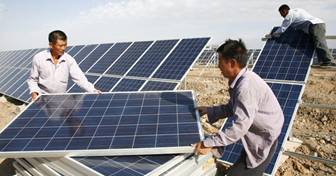China Benefits as U.S. Solar Industry Withers
 |
Chinafotopress/Getty Images
Workers install solar panels at a power station in Hami in the Xinjiang Uyghur Autonomous Region of China.
|
HONG KONG — The bankruptcies of three American solar power companies in the last month, including Solyndra of California on Wednesday, have left China’s industry with a dominant sales position — almost three-fifths of the world’s production capacity — and rapidly declining costs.
Solar panel inspection at a factory in Hangzhou, Zhejiang province. Chinese companies' cost advantages overwhelm any lags in technology, analysts say.
Some American, Japanese and European solar companies still have a technological edge over Chinese rivals, but seldom a cost advantage, according to industry analysts.
Loans at very low rates from state-owned banks in Beijing, cheap or free land from local and provincial governments across China, huge economies of scale and other cost advantages have transformed China from a minor player in the solar power industry just a few years ago into the main producer of an increasingly competitive source of electricity.
“The top-tier Chinese firms are kind of the benchmark now,” said Shayle Kann, a managing director of solar power studies at GTM Research, a renewable energy market analysis firm based in Boston. Pricing of solar equipment is determined by the Chinese industry, he said, “and everyone else prices at a premium or discount to them.”
Besides Solyndra, the other two American manufacturers that filed for bankruptcy in August were Evergreen Solar, of Massachusetts, and SpectraWatt, a New York company. Another company, BP Solar, halted manufacturing at its complex in Frederick, Md., last spring.
Those bankruptcies and closings represent almost one-fifth of the solar panel manufacturing capacity in the United States, according to GTM Research.
Solyndra and Evergreen in particular suffered because they pursued unusual technologies whose competitiveness depended on their using less polysilicon, the main material for solar panels. That has become less important because polysilicon prices have tumbled more than 80 percent in the last three years as output has caught up with demand.
Analysts say that two American companies remain strongly placed. One is First Solar, the largest American manufacturer, which uses a different technology but has its biggest factory in Malaysia. The other, SunPower, is much smaller but is an industry leader in the efficiency with which its panels convert sunlight into electricity, so that they sell at a premium to Chinese panels.
But with Beijing heavily supporting its industry, the Chinese companies are forging ahead.
“There is no question that renewable energy companies in the United States feel pressure from China,” said David B. Sandalow, the assistant secretary for policy and international affairs at the United States Energy Department. “Many of them say it is cheap capital, not cheap labor, that gives Chinese companies the main competitive advantage.”
China’s three biggest solar power companies — Suntech Power, Yingli Green Energy and Trina Solar — have all in the last two weeks announced second-quarter sales increases of 33 to 63 percent from a year earlier.
Yingli and Trina were also profitable in the quarter. Suntech posted a loss, mostly because it broke a longstanding agreement to buy solar wafers — critical components in the manufacturing process — from a Singapore affiliate of MEMC Electronic Materials of Missouri. Suntech aims to make more wafers itself.
Shares in large and small Chinese solar power companies have mostly rallied in the last two weeks on the New York and Hong Kong stock markets, as investors have welcomed their strong quarterly results and the prospect of dwindling competition from Western rivals. Besides the bankruptcies in the United States, solar power companies in Germany, another big producer, have been laying off workers and retrenching.
The recent strength of Chinese stocks “truly reflects the low cost base of the Chinese solar manufacturers, and it is great to see their positioning, particularly relative to their American and European counterparts,” said K. K. Chan, the chief executive of Nature Elements Capital, a Chinese clean energy investment company based in Beijing.